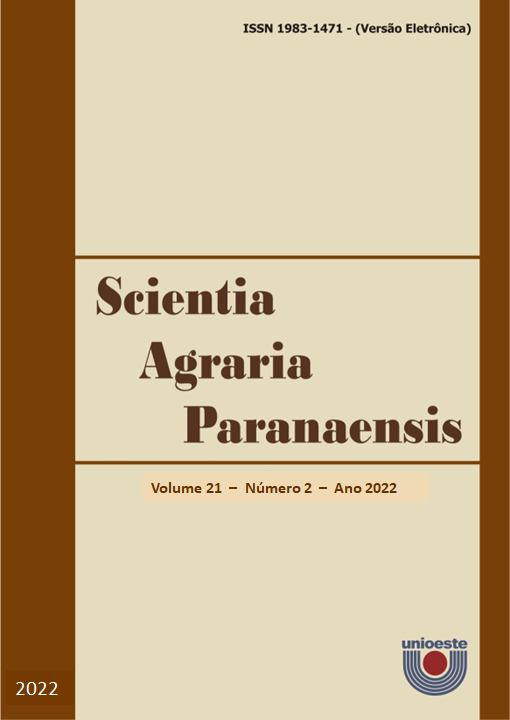Organic fertilization on the productivity of biofortified sweet potato
DOI:
https://doi.org/10.18188/sap.v21i2.28231Resumo
Sweet potato (Ipomoea batatas (L.) Lam.) is a widely grown vegetable in Brazil. The application of organic fertilizers of animal origin is considered a useful and economical practice for producers because it enhances soil fertility and ensures conservation. The objective of this study was to evaluate the commercial potential and total productivity of biofortified sweet potato based on the concentration of applied tanned bovine manure. This study was conducted from February to July 2020 in the experimental area of the Center for Agricultural and Environmental Sciences, Federal University of Maranhão (UFMA), Brazil. The experimental design used was randomized blocks with six treatments (0, 10, 20, 30, 40., and 50 Mg ha-1 of tanned bovine manure) and five replicates. The following agronomic characteristics of sweet potatoes were evaluated: fresh and dry biomass of the shoot (Mg ha-1), fresh and dry biomass of the tuberous root (Mg ha-1), number of commercial roots, and damage galleries (and holes) caused by insects. Bovine manure can be used as a source of organic fertilizer in the range of 10.0-20.0 Mg ha-1 to improve the productivity of biofortified sweet potato ‘Beauregard’. The yield was 7 Mg ha-1 with 10 Mg ha-1 of bovine manure, and this yield is higher than the average yield for the state of Maranhão.
Downloads
Publicado
Como Citar
Edição
Seção
Licença
Aviso de Direito Autoral Creative Commons
Política para Periódicos de Acesso Livre
Autores que publicam nesta revista concordam com os seguintes termos:
1. Autores mantém os direitos autorais e concedem à revista o direito de primeira publicação, com o trabalho simultaneamente licenciado sob a Licença Creative Commons Attribution que permite o compartilhamento do trabalho com reconhecimento da autoria e publicação inicial nesta revista.2. Autores têm autorização para assumir contratos adicionais separadamente, para distribuição não-exclusiva da versão do trabalho publicada nesta revista (ex.: publicar em repositório institucional ou como capítulo de livro), com reconhecimento de autoria e publicação inicial nesta revista.
3. Autores têm permissão e são estimulados a publicar e distribuir seu trabalho online (ex.: em repositórios institucionais ou na sua página pessoal) a qualquer ponto antes ou durante o processo editorial, já que isso pode gerar alterações produtivas, bem como aumentar o impacto e a citação do trabalho publicado (Veja O Efeito do Acesso Livre).
Licença Creative Commons
Esta obra está licenciada com uma Licença Creative Commons Atribuição-NãoComercial-CompartilhaIgual 4.0 Internacional, o que permite compartilhar, copiar, distribuir, exibir, reproduzir, a totalidade ou partes desde que não tenha objetivo comercial e sejam citados os autores e a fonte.


